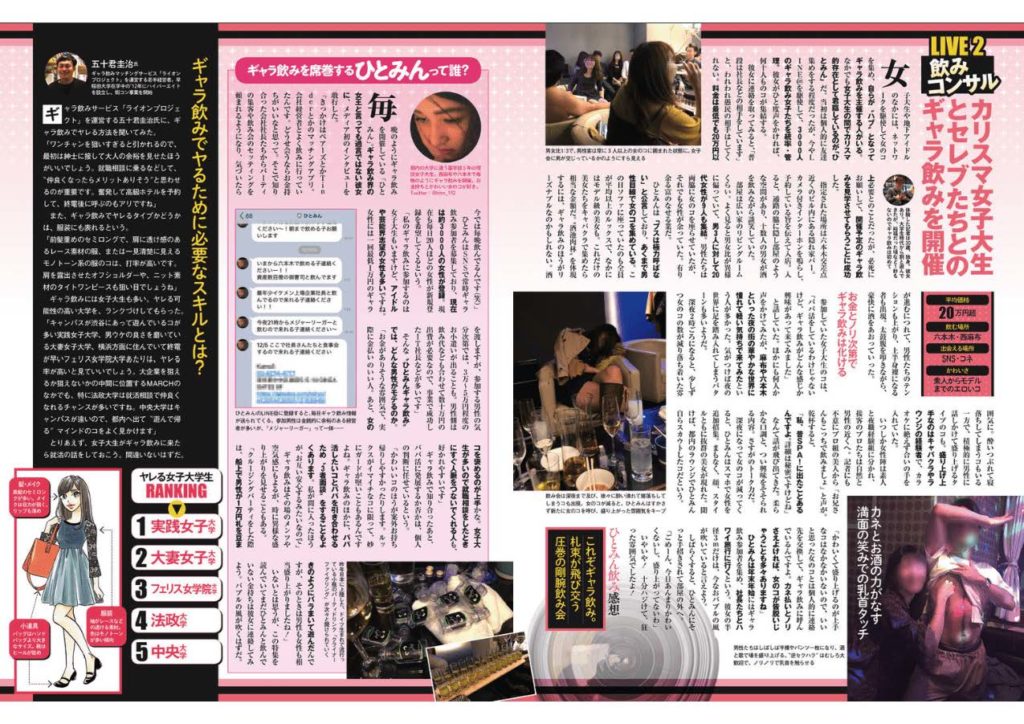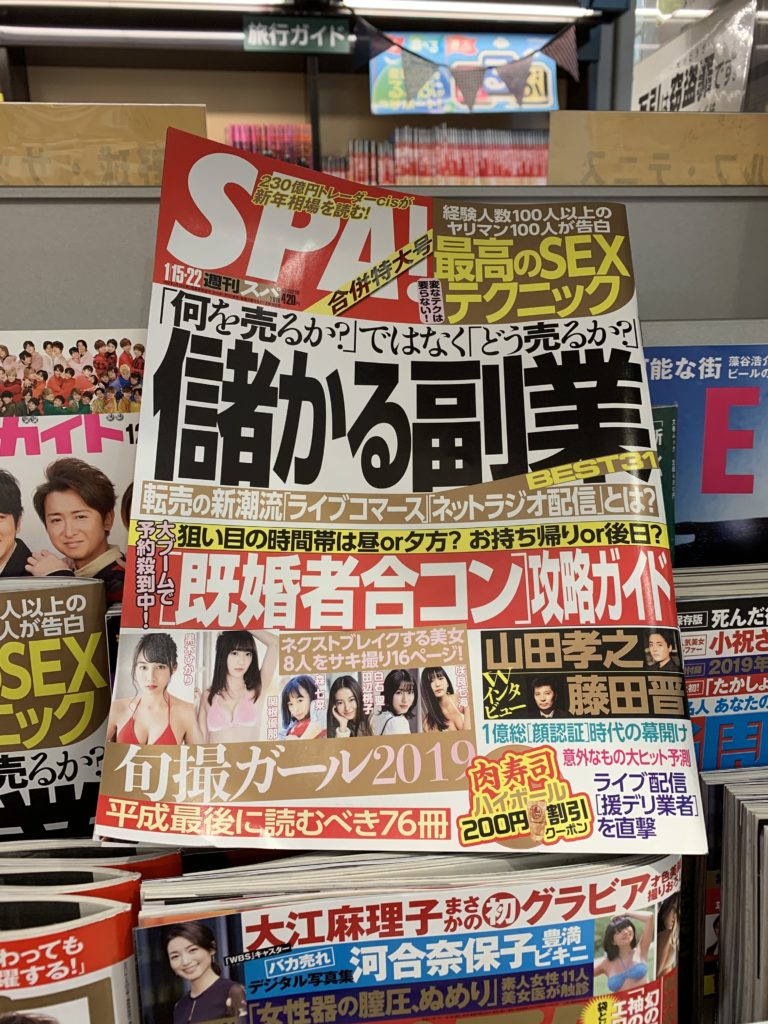by Kaori Shoji
Some men in Japan just don’t seem to get that objectifying women is wrong.
In the land of the rising sun, the objectification of women is not only a thing, it’s a solid tradition and time-honored marketing ploy. Sometimes though, the tables can be turned the other way. This happened when Weekly SPA, a magazine famed for insisting that sex and money are the only things worth striving for, came out with a story in late December about which colleges had the most number of ‘yareru’ (i.e., easily f*ckable) women. Honorable first place went to Jissen Women’s University, followed by other prestigious women’s universities Otsuma and Ferris. Co-ed universities Hosei and Chuo came in 4th and 5th.

Normally, this would have caused a total of zero ripples on the calm surface of Japan’s societal pond (all the scum lurks beneath) but one young woman dared to raise her voice. This is Kazuna Yamamoto, a senior at International Christian University. Yamamoto saw the article and wrote to petition website change.org – that Japan should stop objectifying women, and noted the nation’s women “do not exist [soley] for the benefit of men.” In two days, Yamamoto’s petition amassed close to 30,000 sympathizers.
SPA editor-in-chief Takashi Inukai issued a public apology, saying that ‘yareru’ was in this case, inappropriate. Sorry. What SPA really meant to say, was ‘become on friendly terms with.’ Come on guys, is that the best you could do?
To make matters marginally more demeaning, SPA’s article was really about the practice of ‘gyara nomi,‘ which is a thing among young Japanese. (The ‘gyara’ comes from guarantee – in this case, cash.) In a ‘gyara nomi,’ a group of men meet a group of women at a drinking party. The men pick up the tab, and they are also obligated to offer money to women they find especially attractive. The women may or may not be pressured into sex by accepting the monetary gift but according to ‘Reina,’ a woman who regularly attends such gatherings, says “the sex is sort of mandatory. I mean, you can’t say no after the guy pays you. For myself and a lot of other girls, it’s a side hustle.” SPA covered an actual ‘gyara nomi’ party and an app that matches up college girls from the aforementioned universities wanting to earn a little cash, and men looking for a quick roll in the hay. It goes without saying that gyara nomi are limited to women under 25, (pre-Christmas cake age) though men do not face that censure.

Two factors are at play here: the objectification of women surely, but it’s also about women seizing the opportunity to cash in on their objectification. In a pathetically perverse way, you could say this is a win-win situation, or at least a supply and demand equation. Such a scenario is nothing new under the rising sun. Until Japan finally opened its doors to the West, objectifying women was so taken for granted the women themselves thought nothing of it.
By the way, the geisha trade of old was all about pushing the envelope of objectification: the closer a geisha got to simulating a perfectly made-up doll who danced and poured sake for her male clients (with a hinted promise of post-party sex), the better.
And in spite of all the water under the bridge and modernization with a vengeance, not a whole lot has changed. The practice of gyara nomi attest to the fact that Japanese men would would rather pay for sex, than god forbid, having to go through the arduous process of talking with a woman and getting to know her, and her consent– before taking her to bed.
As for the women themselves, like the aforementioned Reina many see their youths as a side hustle. If men and society insist on viewing college girls as ‘yareru’ cuties slinging Samantha Thavasa handbags over their arms, then there’s no shortage of college girls who bank on that view. Wearing short skirts, attending gyara nomi parties and then the next day, laugh about the men with their girlfriends at Starbucks. What’s the harm – but more to the point, how will they finance those Samantha Thavasa handbags if not through men? No self-respecting college girl wants to admit she had to buy one all on her own. With the exception of a weird few who want to waste their precious youth pursuing a medical degree (we know where such lofty ambitions wind up), young women find it easier to cater to male fantasies, and be compensated in one way or another for their trouble.

An apology from SPA will not likely change the way things are, but maybe, just maybe – it’s a tiny step taken toward…not anything so drastic as equality but non-objectification? On the day after the SPA fiasco, Peach John – one of Japan’s most lucrative women’s lingerie companies – issued an online apology about ‘inappropriate wording’ on one of their products. This was a supplement, touted as a ‘love potion.’ “Slip it into a loved one’s dish or cup, to get that person in the right mood for love” said the product description. (Editor’s note: At least that sounds better than menstrual blood in Valentine’s Day chocolates ) Peach John terminated its sales and promised that they will be “more careful” about choosing the right phrases. Cash, potions, deception, discrimination…would this all go away if Japanese men and women just learned to talk to each other?
****
Memo: From the petition
Recently a Company called Shuukan Spa has released a ranking of “University students with easy-access girls” on a public magazine. (Published October 23, 2018)
2018 was a year where women from all over the world fought for women’s rights, so that our voices were delivered.
Japan will be having the first G20 summit this year, 2019 and it is ridiculous for an article such as this to be published. It’s not funny at all.
I would like to fight so that especially on public articles such as this one, sexualizing, objectifying and disrespecting women would stop.
We demand Shuukan Spa to take this article back and apologize, and promise to not use objectifying words to talk about women.
This sexualizing of women is not funny.
In Japan according to a study done by the Ministry of Justice, only 18.5% of the women report sexual assault or rape.
How about the left over 81.5%?
They don’t speak up. Can not speak up.
Why?
Because sexual assault, random guys touching your butt in public trains, having their crotch up your butt, rape, is something women have to deal with.
Because We use underaged girls in bikinis to fulfill the fetish of those who love baby faces.
Because we idolize young girls.
Because honestly, the society hasn’t changed ever since the time of comfort women.
Because men and women do not believe that we are worth the same as men.
In this world, 1 out of 5 women are raped or sexually assaulted before their 18th birthday.
According to the ministry of Justice, only 1 out of 10 people actually get convicted, after being sued for sexual assault.
In 2018, the world fought.
In some countries, abortion finally became legal.
100 year anniversary since Women got voting rights.
Women in Saudi Arabia were able to drive.
And using Social Media, people spoke up using #MeToo #NoWomenEver and in South America, #NoEsNo and #AbortoLegalYa.
This year we will not only hold the G20 nor but the W20 (women 20)
We demand that the media stops using words to discriminate women, objectify women, disrespect women and sexualize women.
We, women are not less than men.
We are human too.
We do not LIVE for men.
We do not exist for men.
Let’s raise our voices because I am sick of this society where women are objects.
Other GROSS articles
https://nikkan-spa.jp/144457
The company behind called Fuji Media Holdings that also
write about Corporate social Responsibility, talking about SDGs.
http://www.fujimediahd.co.jp/csr/index.html

A failed little blog about a western feminist kid bashing on Japan.
Sorry kid, Japan has one of the lowest rape and murder rates in the entire world.
–Editor’s note. Sorry kid, Japan has one of the lowest reported rates of sexual assault in Asia. It’s estimated by even the government that only 18% are reported. Prosecutors estimate that it may be as low as 4%.
Also men liking women is what all healthy women like, your site is all broken as well and is insecure. The few feminists you cite and the purpose of your blog is questionable. Get a life you sad weirdo.
–Editor’s note: Anyone writing into a blog, “get a life you sad weirdo” is probably a sad weirdo.
Claiming Japan is unsafe and is rife with crime also makes you and the failed writer disingenuous beyond all known crime figures, Japanese Americans are also the lowest crime committing group even in the USA. Get a life, sad losers.
–Editor’s note: Didn’t you already say that? Have you tried books on building vocabulary?
The only women who hate men liking women, are ugly damaged women who are jealous and insecure. They hate to see other women getting attention, so they write BS articles and cry about it since they hate men for not giving them such attention. You are all going to hell for your pathetic behaviour.
–Editor’s note: That’s a pretty stupid sexist statement. I don’t know if there’s a hell but where do you think you will wind up pretty boy?